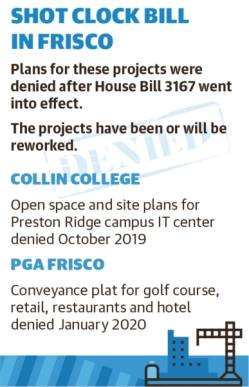House Bill 3167, often called the "Shot Clock Bill," went into effect Sept. 1 and gives cities 30 calendar days to respond to plats, site plans and other development plans. These plans have typically taken 45-90 days to go through the approval process, according to previous reporting by Community Impact Newspaper.
The city had 4-6 weeks to prepare to comply with the Shot Clock Bill, City Development Services Director John Lettelleir said.
“Any time you have something new, there’s always bumps in the road,” Lettelleir said.
State law already required cities to act on plats within 30 calendar days, but the tighter timeline on other development plans has resulted in more denials, Lettelleir said.
Since the law went into effect, notable projects that received denials on development plans include the Professional Golfers’ Association of America headquarters and Collin College’s IT Center at the Preston Ridge campus.
“We’ve had a number of plans that have been disapproved,” Lettelleir said. “But one of the big things that’s come about is we don’t have the backlog of cases that we used to have under the old system.”
Lettelleir said that before HB 3167, around 50 cases would hang around in the old system for months at a time.
The Shot Clock Bill has also improved the quality of plans from developers, Lettelleir said.
“It has put the development community on notice that [they] need to make good plans to start off,” he said.
Lettelleir said the development services department will continue monitoring the effects of the Shot Clock Bill over this year to tackle common mistakes and identify trends. The city will also look at how other cities are complying with the law.
Since September, Lettelleir said, his department have charged developers the initial submission fee a second time when a plan is resubmitted following disapproval. This was done to compensate for the added time that development services staff takes to review new plans.
Overall, Lettelleir said the law’s benefits outweigh the negatives, as cases will be able to move through the process faster.
“At the end of the day, it comes down to who the developer hires to do the work on those plans,” he said.






